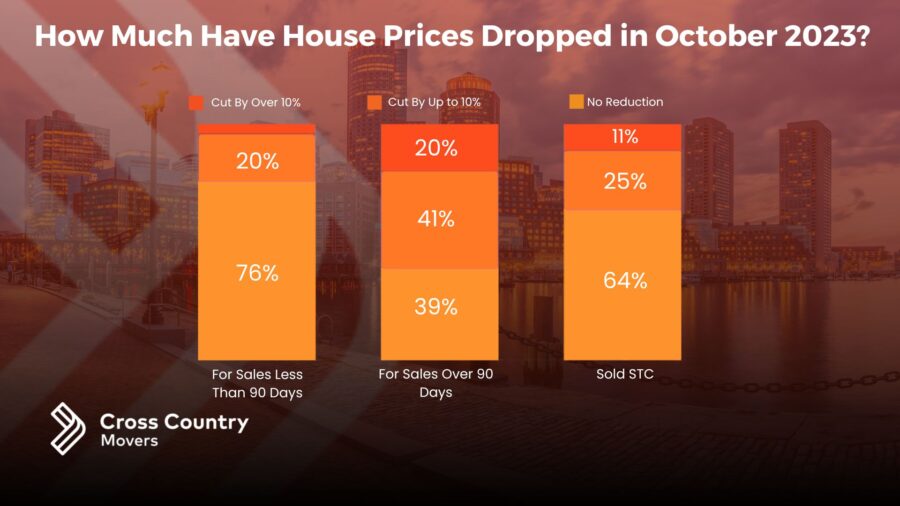

When to Lower the Price of Your Home for a Smooth Long-Distance Relocation
Posted in Looking for a Home,Moving Essentials on June 10, 2024
Setting the right price for your home from the start is very important for the housing market. But even if you set the price correctly, it may stay on the market longer than you thought it would. In these situations, you may think about when to lower the price of your home.
If your home stays on the market longer than similar ones, sparks interest without offers, or doesn’t get as much online activity as other ads in the area, you should lower the price. It’s important to look at the local market conditions, how fast similar houses are selling, and how buyers act. If you’re moving long-distance, making quick, smart price changes can help you stay on schedule. Getting advice from real estate professionals can also help you figure out how to price the home correctly.
Understanding the Real Estate Market
All around the US, one in four buyers now lower their asking prices in the first 90 days after putting their residence on the market. This number goes up to 61% for people whose residences have been on listings for longer than three months.
Currently, the asking prices of 36% of recently sold residences (pending contract) have been lowered.
This is especially true for people in the United States – a big part of most people’s wealth comes from real estate. The Federal Reserve Bank of St. Louis published an economic study that said 66% of people in the US owned their home in the first quarter of 2023. Many buyers are interested in and make money in the real estate market because of its size and scope.
Changing the asked price isn’t just a result of how the market works – it’s also a smart move to make sure the property sells quickly. People who are moving cross country want to be able to sell their homes quickly so that they can get the most out of their investments and get rid of any problems that might stop or slow their moving plans.
If this sounds like something you’ve heard before, it’s not unusual. It can be very frustrating when a house doesn’t sell as fast as expected. Selling a house is an emotional and complicated process. Asking things like, “Was the first price too high?” or “How long should I wait to lower the price of my home?” are common questions asked by sellers. Especially those who are moving across the country and need to quickly sell their current residence to make the move go smoothly.
Initial Pricing Strategy
In the real estate market, it’s very important to set a fair original asking price. A correct price can quickly bring in the right buyers, cut down on the time the property spends on the market, and avoid the negative connotations that come with homes that haven’t sold. If you set the price too high, potential buyers might not be interested, which could make the selling process take longer and mean you have to make big price cuts later on.
To set a fair and competitive price from the start, you should think about a few important things:
- An appraisal from a professional. A professional appraisal gives you an unbiased opinion of how much the home is worth by looking at recent sales of similar houses in the area, the current market trends, and the place’s unique features.
- Comparative Market Analysis (CMA). To find a fair price for the home, this method looks at the prices of similar abodes that have recently sold in the same area. To set a fair first price, you need to know how the local market changes and how related homes are priced.
- The state of the market. Because real estate markets are always changing, asking prices are being changed more and more often. Knowing about the economy and real estate trends in general can help you set the starting price.
- Buyer behavior. Many buyers are still looking for good deals, especially since budgets for people with mortgages have shrunk over the last year. Because of this, it’s important to price homes so that they meet market standards without being too cheap.
Talking to a real estate agent is what we recommend for serious sellers, especially those who want to get an offer quickly, like when they need to move to a new state. An experienced agent can help you set the right price for the home so that local buyers will be interested.

When to Lower the Price of Your Home – How to Notice the Signs
It can be hard to figure out when to lower the price of the property before relocation preparations start, but some signs can help you make this important choice. Keep an eye out for some of the sure signs that it might be time for a price change.
Reduced Foot Traffic
If your place isn’t attracting as many visitors as similar properties in the area, it could be a sign that the price is set too high. Properties that match the size and location of yours (for instance, a two-bedroom home in the best neighborhood in Denver) but are drawing more foot traffic likely have a more appealing price point to potential buyers.
High Interest but No Offers
A lot of foot traffic and interest but no serious offers is a clear indicator that while buyers find the home appealing, they don’t see enough value at the current price. This discrepancy often prompts buyers to continue looking rather than making an offer, suggesting that a price adjustment might be necessary to convert lookers into buyers.
Faltering Online Engagement
In the digital age, online presence is crucial. If a listing receives significantly fewer clicks, saves, or shares compared to similar properties listed on platforms like Zillow or Facebook, this can indicate that the price is not meeting the market expectations. High engagement online typically reflects competitive pricing, while low engagement suggests the need for reevaluation.
Understanding Market Dynamics
Rather than focusing solely on Days on Market (DOM) compared to the local average, it’s often more telling to monitor the sales activity of comparable homes and the overall inventory in the area. If the area has a high inventory, homes might naturally have a longer DOM. However, if inventory is low and your home still isn’t selling, this is a strong signal that a price reduction might be warranted.
Impact of Overpricing on Long-Distance Relocation Plans
Overpricing a home can severely disrupt long-distance moving plans. An overpriced property tends to linger on the market, delaying the move and making you do something last-minute. This can mess up the timeline for job starts, school enrollments, and moving services.
The funds from the home sale are often earmarked for buying a new house or covering relocation costs.
A delayed sale means you can’t access these funds when needed, increasing the expenses through ongoing property costs and possibly requiring more expensive, last-minute cross-country moving services.
Homes that sit unsold may be viewed as less desirable, leading to further price drops. This is a significant issue when you’re trying to coordinate a sale with the purchase of a new place in another state. Additionally, the uncertainty of an overpriced home sale adds stress, complicating the already challenging process of interstate moving. It can affect your ability to make competitive offers in a new city and necessitate temporary housing, further straining the budget.

Strategies for Lowering the Price
Adjusting the price of the home can be key to a successful move, especially when relocating across the country. Here are some good strategies to consider:
- Quickly lower the price if signs like few showings or no offers indicate it’s too high. This helps attract buyers and keeps plans to relocate to another city on track.
- Regularly compare home’s price with similar properties in the area. Match the price with current market values to make the listing competitive.
- Consider small, regular price reductions instead of a large cut. This approach keeps buyer interest and helps find the right price point without significant losses.
- Consult with a real estate agent familiar with sales before long-distance relocations. They can guide your pricing strategy to match both local market conditions and the moving timeline.

Leveraging Professional Help for a Seamless Relocation
For a successful long-distance relocation, it’s crucial to enlist the help of professionals who can streamline both the selling and moving out-of-state process. It’s possible to sell a house without an agent and to organize a relocation by yourself, but why not do everything stress-free?
Real estate agents are experts essential for pricing a home and changing it based on market feedback. They know local real estate markets, which helps sell a house quickly and for a fair price. Their repricing and selling advice can accelerate your move.
Coordinating the relocation logistics is another area in which professionals such as Cross Country Movers are indispensable. A reliable relocation company can align their schedule with your home sale timeline, offering flexibility and solutions like temporary storage if there’s a gap between selling the old home and moving into the new one. They handle the heavy lifting, offer packing assistance, and provide car shipping, which reduces the stress and allows you to focus on settling in.

Preparing for the Move After Selling
Once the house sells, the next step is selecting a trustworthy moving company, such as Cross Country Movers, to handle the long-distance relocation. Look for long-distance movers with positive reviews and a solid track record of reliability. It’s essential to verify their credentials, including licensing and insurance, to ensure they can safely transport your belongings across states. Getting multiple quotes can also help you find the best service for the available budget and needs.
Planning the Move
After choosing the moving company, it’s time to organize the relocation process. Create a detailed checklist of tasks you need to complete before the moving day, such as changing the address, setting up utilities at the new home, and arranging for the transfer of school records if you have children. Establish a clear timeline from the date of sale to the moving date, allowing for essential steps like final home inspections and the packing schedule for belongings. Proper planning will help make the transition to a new home smoother and less stressful.
How to Use Home Inspection to Lower the Price of a Home in the New City?
You can leverage the results of a home inspection to potentially reduce the purchase price. However, it involves a few key steps:
- Arrange a thorough home inspection as soon as your offer is accepted. This will identify any issues or repairs that need to be addressed.
- Carefully review the inspection report for any major problems such as structural issues, outdated electrical systems, roofing problems, or plumbing issues.
- Obtain estimates for necessary repairs from reputable contractors. This helps in quantifying how much you might need to invest after purchasing the home.
- Use the findings and repair estimates to negotiate with the seller. You can ask for a lower price or request that the seller make repairs before the sale is finalized. Be prepared to provide copies of the inspection report and repair estimates to support the case.
- Depending on the seller’s response, decide whether to proceed with the purchase at a new negotiated price, ask the seller to fix the issues, or walk away if the costs and efforts outweigh the benefits.
These steps will make the relocation smoother and more cost-effective.

Ensure a Stressless Transition With Cross Country Movers
Long-distance moving requires good home pricing and sale management. You can ease the process by recognizing when to lower the home’s price, hiring professionals, and preparing well afterward. Using a house inspection to negotiate a lower price helps you find a deal that fits the relocation demands and budget.
If you’re gearing up for a cross-country move, partner with a reliable company. Contact Cross Country Movers today to get a quote and start planning the move with experts who know the challenges of long-distance relocations. Ensure as seamless and stress-free relocation as possible with professional support every step of the way.







